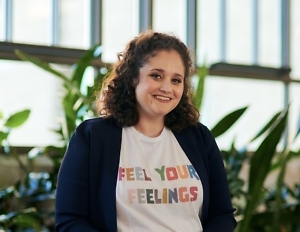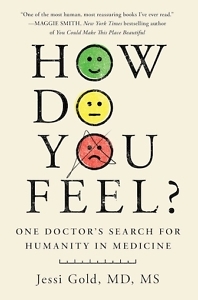Healing the Healers
A psychiatrist urges healthcare workers to bring their full humanity to the workplace
The COVID-19 pandemic took an undeniable toll on medical professionals’ mental health, but in How Do You Feel? One Doctor’s Search for Humanity in Medicine, Dr. Jessi Gold argues that the culture of the medical field itself greatly exacerbated depression and burnout among healthcare workers. Part memoir, part argument, and part self-help manual, How Do You Feel? challenges dangerous assumptions, common to the public and healthcare workers alike, about what it means to be a good doctor or nurse.

Dr. Gold is an associate professor of psychiatry at the University of Tennessee Health Science Center in Memphis and chief wellness officer of the University of Tennessee system; hence, many of her therapy clients are medical students, doctors, and nurses. How Do You Feel? follows Naya, Luke, Janet, and Megan, four composite characters derived from the real-life clients Gold treated between March and November 2020. It also chronicles Gold’s sessions as a patient with her own therapist.
In addition to detailed accounts of therapy sessions, Gold also shares anecdotes from her own medical training and statistics from her research on the profession’s “hidden curriculum”: its unofficial prohibition on vulnerability and displays of emotion by practitioners. The book opens when Gold commits an embarrassing, possibly harmful error in a session with a client, an event which alerts her to her own deteriorating mental health. Following the usual recommendations — take time off, feel your feelings rather than dissociating, don’t be ashamed to take medication for depression and anxiety — proves easier said than done for medical workers, including Gold herself. As her client Luke says, “Trying to get help doesn’t usually result in getting help. People don’t forget that you tried.”
 Like her clients, Gold experiences dissociation, cognitive distortions, and burnout as she tries to meet her own expectations of perfection and stoicism. She realizes that while these values allow doctors and nurses to do their jobs effectively, they can also sabotage practitioners’ mental health: “[T]he fact that healthcare doesn’t teach us how to deal with emotions in the workplace affects all parties significantly, increasing rates of burnout as one person passes it on to the next, like a contagion.” As an antidote, How Do You Feel? offers suggestions such as telling one trusted person about a mental health diagnosis and pausing during the day to evaluate one’s emotions. Even these seemingly modest steps prove challenging for medical professionals during a global crisis.
Like her clients, Gold experiences dissociation, cognitive distortions, and burnout as she tries to meet her own expectations of perfection and stoicism. She realizes that while these values allow doctors and nurses to do their jobs effectively, they can also sabotage practitioners’ mental health: “[T]he fact that healthcare doesn’t teach us how to deal with emotions in the workplace affects all parties significantly, increasing rates of burnout as one person passes it on to the next, like a contagion.” As an antidote, How Do You Feel? offers suggestions such as telling one trusted person about a mental health diagnosis and pausing during the day to evaluate one’s emotions. Even these seemingly modest steps prove challenging for medical professionals during a global crisis.
Criticized as a medical student for her casual, chatty demeanor with patients, Gold fully embraces that communication style in How Do You Feel? The book is studded with references to Taylor Swift, Jersey Shore, and other pop culture touchstones. We learn that withdrawal from Lexapro can be “gnarly” and that “COVID seems to heighten the stress of being a new mother times about a thousand percent. That’s the scientific number.” This friendly, relatable voice is integral to the book’s thesis: that the successful practice of medicine depends on healthcare workers’ embracing their full humanity, including perceived weaknesses. “Healing the healers,” Gold concludes, “affects us all.”

Whitney Bryant is a writer, teacher, and editor. Her work has appeared in The Georgia Review and One Story. A graduate of Vermont College of Fine Arts, she lives in Nashville.


